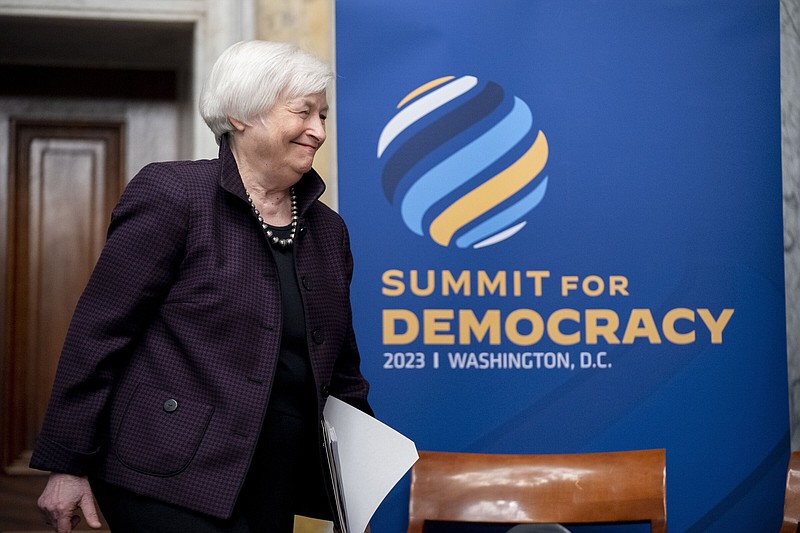Treasury Secretary Janet Yellen affirmed America's commitment to enhancing corporate transparency Tuesday, with more than 20 other countries participating in this week's Summit for Democracy.
While the Biden administration is already working to establish a new database on small business ownership, Yellen pledged that her department will maintain the database, known as the beneficial ownership registry, and will ensure law enforcement maintains access. She said individuals' personal data will be protected.
"The beneficial ownership database will deter dirty money from entering the U.S.," Yellen said in a speech before the summit began.
The registry will contain personal information on the owners of at least 32 million U.S. businesses as part of an effort to combat corruption.
Colombia, Malta and Japan are some of the countries included in the commitment.
"Unmasking shell corporations is the single most significant thing we can do to make our financial system inhospitable to corrupt actors," Yellen said. She added that efforts with allies over the last year to track sanctioned Russian assets have "underscored our vulnerability" in tracking business ownership.
The United States is making the push to combat illicit finance, partly as a response to Russia's invasion of Ukraine, as the U.S. tries to more easily identify wealthy Russians who are accused of hiding stolen money and assets in the U.S. and around the world.
The two-day summit opens today. The U.S. is co-hosting it with the governments of Costa Rica, the Netherlands, South Korea and Zambia.
Last September, the Treasury Department began rulemaking to create the small business ownership database. The rule will require most American businesses with fewer than 20 employees to register with the U.S. government as of Jan. 1.
"We have seen corrupt foreign officials bury stolen funds in U.S.-based shell companies; kleptocrats launder kickbacks through anonymous purchases of foreign real estate; and elites move corrupt proceeds through complicit or unwitting financial gatekeepers like attorneys or wealth managers," Yellen said.
The National Small Business Association filed a lawsuit in November to stop the U.S. database from being created, arguing it is unduly burdensome on small firms and infringes on states' rights to regulate businesses.
Nate Sibley, a research fellow with Hudson Institute's Kleptocracy Initiative, said the "beneficial ownership registry, properly implemented, is an essential and long overdue tool for tackling money laundering and sanctions evasion."
"It's absurd that the U.S. promulgates the most aggressive global sanctions and law enforcement campaigns but can't see who is burying money in its own backyard," Sibley said.
Ian Gary, executive director of the Financial Accountability and Corporate Transparency Coalition said the Biden administration should also move to "put in place new regulations to tackle the scourge of money laundering in the $50 trillion U.S. real estate sector."
During a panel Tuesday after Yellen's speech, Lakshmi Kumar, policy director at the Global Financial Integrity think tank, said governments should begin pursuing "gate-keepers" of illicit finance, which includes lawyers, accountants and money-managers of suspected criminals.
"We've seen white-shoe law firms either willingly, knowingly or inadvertently support criminal organizations, arms traffickers" and other bad actors, Kumar said.
Last year, the Biden administration supported the Enablers Act, which is meant to expand the definition of the Bank Secrecy Act -- and require accountants, lawyers and other professionals to conduct due diligence checks on their clients' money to ensure it doesn't come from money laundering.
The Bank Secrecy Act currently applies to financial institutions, however, professional organizations successfully lobbied to keep the legislation from becoming law through the 2023 National Defense Authorization Act.
